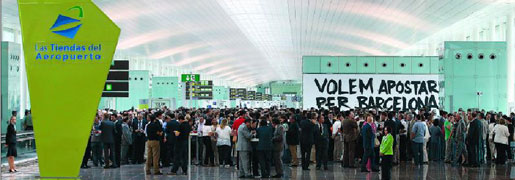Unbelievable we’re already here. After six years of dedicating an important part of my professional life to Barcelona’s Airport, today Terminal 1 is officially born. We’ll listen to the politicians’ speeches on how they made this possible. Maybe they did, but we worked all the way through. And this feeling, this pride, this sense of belonging will carry on with us the rest of our (professional) lives.
A huge, unique project can only be done with the commitment of a group of people. A group of people ready to withstand many pressures and surmount uncountable odds. Very diverse people, some very qualified, some able to star and shine without that qualification.
There are some pass-byers as well. The latter will be all in the official celebration today, even publicly displaying their self-attributed mothering. Isn’t it sad that people that have not appeared in the life of the project, and could have done things to support it, they come now for the medal?
We’ve learnt many things here. We’ve lived through many successes, and mistakes too. Fortunately! You can’t learn if you always do everything well. It would give you a false sense of security that would undermine your judgement.
But even if you make mistakes, you can’t learn unless you can reflect on past experiences. Unless you can evolve. That’s our duty today as nucleus of the project that has created the biggest Spanish airport terminal of all times, the biggest infrastructure that has been built in Barcelona for the last decades. We must make this exercise and learn.
Nothing of this would have been possible without the engineers. People think of architects, but they only make a small part of the project: they don’t make things work. Specially star architects that have seldom appeared during the project and have been more of a nuisance than anything. Till now this was the realm of the engineers. It was our time. Not any longer. Now it’s turn for the airlines and for the people that maintain the airport to work. It’s time for the passengers, for Catalans, to make this terminal their own. This terminal will be the first, and last, thing that visitors to Barcelona, and Catalonia, will see. It’s for all of us.

Yes, that was yesterday. And I was there. And from the experience I can tell you that I felt that my commitment for this project for so many years had been worth it. I feel as I have participated in something big, something important for my country. And this, in itself, is a reward as well for me.
